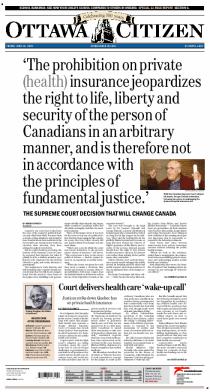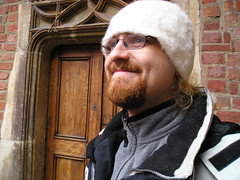Gay Marriage
To be clear: I support gay marriage.
On to the arguments.
Origination versus perpetuation
The argument against gay marriage goes like this: The institution of marriage began for reason X. Gay marriage is not X, or violates X. It follows that we cannot allow gay marriage. To give this more content: The institution of marriage was founded or started to provide a secure context within which children can be raised. Gay people cannot have children. Since the institution of marriage is for children, gay people should not be allowed to get married.
I will leave aside whether or not, at some point in the future, technology can make it possible for gays to procreate. There are reasons to oppose this use of technology, so it would muddle the waters to consider this here.
There is an explanation for why something started, and one for why it continues. The two are not always the same, even if they might be in a large number of cases.
Just because the primary function, and original intention, behind, say, an orange peeler is to peel oranges, that does not mean that, should it prove to be excellent at opening cans of prunes, say, we ought not use it for that reason. It's fine, in my opinion, to use it for the opening of cans of prunes, even if very few people will find it useful for this purpose, or only a handful of people ever do use it for this reason, and so on.
Other than raising children, is marriage useful or good for other things? Sure it is. Since we like to partner up for reasons of mutual comfort, maybe as a form of insurance, and so on, marriage seems like a great sort of institution to formalize those things. Some couples, for instance, choose not to have children. Others find that they cannot, through infertility. Some of these continue to see the benefits of marriage, outside of the procreative function.
Thus procreation, though hardly irrelevent, is not the sole function of marriage, even if it may be said to have been the reason for its founding.
Objections?
One possible objection is to suggest that by emphasizing the non-procreative functions of marriage, we might destroy the institution for that (procreative) function. This is plausible. If, for instance, the orange-peeler begins to be used more frequently for opening cans of prunes, or it becomes more obvious to people that that's what it's best for, then we might shift emphasis and use it for the latter purpose, rather than the former.
I don't, however, see how this might come about. Since homosexuals comprise, at best, three or four per cent of the population (I don't buy the ten per cent figure...), and those couples without children will persist in minority status, I cannot see how marriage might lose its tight association with having children. Of course, if those concerned with marriage continue to stammer on about gay marriage, we might begin to think that the only people who get married are gays. But I don't think that's likely.
Constraints versus Licence
I'm surprised by the following argument: Gay marriage is about licence. It is about the desire to pursue our individual preferences without constraint. It is individualism run wild. Marriage, however, is really about constraint. We ought not to allow gay marriage because supporters of gay marriage talk about it as though it were a sort of licence to do as we please. I'll cite an example of this, because I think, to most, this will come as a really bizarre sort of argument.
It gets everything exactly backwards. As I wrote in a response to that post by Angry:
"I am utterly confused about the equating of gay marriage with the sort of individual rights that you sneer at. Gays have said that they, too, would like to enter into long-term contracts with their significant others to (rationally) constrain immediate benefits for greater gains over time.Rational Choice?"Right now gays have no bonds or 'official' commitments recognized by their communities. Right now is when they can go ahead and screw anything that walks, should it please them. It looks to me like they are looking for communal constraints on just this sort of behaviour. They appear to me to be looking, and asking for, constraints!"
Speaking of rational constraints: Is marriage consonant with, or in opposition to, rational choice theory, and the view that human beings are preference-optimizers/maximizers? The answer here should in no way suggest that marriage actually *is* a sort of rational choice decision where we weigh benefits and burdens and decide to chase after it. Whatever the actual fact of the matter, rational choice is a plausible explanation of it as well. That is, marriage is rational.
Why is it rational? If we view rational choice not as the attempt to maximize our preferences at every instance, but over time, then constraints on current pleasures, or on pleasures of a certain sort or kind, can yield greater utility/pleasure (whatever) over time, or utility/pleasure (whatever) of a certain sort or kind which we prefer. Of course, rational choice is precisely about this sort of behaviour--maximizing preference satisfaction given our own preferences and our own time horizon (or preference over when we want to be satisfied).
I have to admit that I can't quite see how or why viewing marriage as a constraint on immediate gains is offered as an argument against gay marriage, but I assure you that it is.








